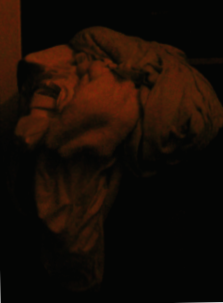"Rumi is considered the greatest mystic poet of Iran . . . As an Iranian, I am immensely proud and delighted to see that Rumi's work is being widely recognized in the West at a time when my country's image is otherwise tarnished." - Empress Farah Pahlevi to the New York Times 11 years ago.
Poetry can be seen on the streets of Iran as the protesters rise up, and Pahlevi told the Daily Beast this week:
"She's hopeful that she is watching the beginning of the end of Iran's theocracy -- and the three decades of repressive Islamic rule that followed her husband's departure." Tina Brown asked the deposed queen, "Do you think the Twitter revolution, as they're calling it, is the major difference between your day and now? The speed with which people can communicate? You faced a revolution that was not powered by any of these technological means." Pahlevi replied, "Well, I remember what my son said many years ago: 'If Khomeini came with tapes, Khomeini then will disappear with the Internet.' And I think it's happening."
Something has happened thanks to the World Wide Web. We are all deeply and irrevocably connected as evidenced by Nico Pitney's Huffington Post LiveBlog with upwards of 100,000 comments, Twitter now keeps us in contact to a degree that nothing could during four post-Hurricane Katrina days while the world waited. Waited for news, waited for help -- just waited. That has changed so dramatically that if a disaster befalls New Orleans or any other town, I am now confident that my city will no longer be in the dark.
New Orleans is arguably the most mystical place in the country, and our own whirling dervishes will celebrate St. John's Eve this weekend. (This story takes a bit of a turn, but I'll do my best to tie it all together). During a trip back to New Orleans last spring I noticed that a pile of sheets which looked perfectly normal during the day looked like this as the shadows changed at dusk:

It looked to me like the poet Rumi, sculpted from sheets. My husband's band was on a European tour at the time so I bought a cheap camera and captured photographic evidence. Having seen it, he assures me he didn't mean to leave a sculpture, just a pile of clean sheets that happen to resemble a dervish. I posted the photo last year and a reader requested a MySpace page for it, but I demurred for fear of starting a new religion. I will, however, be linking the story on Twitter where Rumi's countrymen and women have found their voice.
The humanity of Rumi's work has gone global. In 2007, schoolbells rang across Iran to celebrate what would have been his 800th birthday, and he remains one of the most popular poets in the world. His immense volume of work was sparked by an encounter with Shams, the wandering dervish.
My first Rumi post ran on Father's Day along with a poem that consoled me after losing the best of all possible fathers. Rumi made of sheets turned up on the first anniversary of losing him. My father had Alzheimer's Disease, my mother does too, and The Ocean Moving All Night captured their slipping away. Sheet-Rumi, Dr. Ray Dalton, St. John's Eve, Twitter and the poetry of Iran. The internet is spinning us to a degree that a dervish could love.
The Ocean Moving All Night
Stay with us. Don't sink to the bottom like a fish going to sleep.
Be with the ocean moving steadily all night, not scattered like a rainstorm.
The spring we're looking for is somewhere in this murkinessSee the night-lights up there traveling together, the candle awake in its gold dish.
Don't slide into the cracks of the ground like spilled mercury.
When the full moon comes out, look around.- Jalal ad-Din Muhammad Balkhi-Rumi

